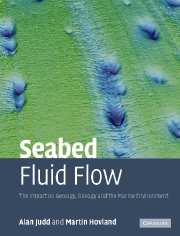Book contents
- Frontmatter
- Contents
- Preface
- Acknowledgements
- Note on the accompanying website
- List of maps on the accompanying website
- List of contributed presentations on the accompanying website
- 1 Introduction to seabed fluid flow
- 2 Pockmarks, shallow gas, and seeps: an initial appraisal
- 3 Seabed fluid flow around the world
- 4 The contexts of seabed fluid flow
- 5 The nature and origins of flowing fluids
- 6 Shallow gas and gas hydrates
- 7 Migration and seabed features
- 8 Seabed fluid flow and biology
- 9 Seabed fluid flow and mineral precipitation
- 10 Impacts on the hydrosphere and atmosphere
- 11 Implications for man
- References
- Index
2 - Pockmarks, shallow gas, and seeps: an initial appraisal
Published online by Cambridge University Press: 14 October 2009
- Frontmatter
- Contents
- Preface
- Acknowledgements
- Note on the accompanying website
- List of maps on the accompanying website
- List of contributed presentations on the accompanying website
- 1 Introduction to seabed fluid flow
- 2 Pockmarks, shallow gas, and seeps: an initial appraisal
- 3 Seabed fluid flow around the world
- 4 The contexts of seabed fluid flow
- 5 The nature and origins of flowing fluids
- 6 Shallow gas and gas hydrates
- 7 Migration and seabed features
- 8 Seabed fluid flow and biology
- 9 Seabed fluid flow and mineral precipitation
- 10 Impacts on the hydrosphere and atmosphere
- 11 Implications for man
- References
- Index
Summary
The North Sea's fattyness is, after its saltiness, a peculiar property, … It should be assumed here that in the ocean as on land there exists, here and there, seepages of running oily liquids or streams of petroleum, naptha, sulphur, coal-oils and other bituminous liquids.
Translated from Erich Pontoppidan, 1752This chapter begins with a review of the pioneering work undertaken on the Scotian Shelf, off eastern Canada, by L. H. King and his colleagues at the Bedford Institute of Oceanography. However, having ‘cut our teeth’ in the North Sea, the pockmarks and seeps here have become the standard against which we compare those of other areas. Consequently it is appropriate to review our early studies of North Sea pockmarks. This provides a historical perspective on pockmark research, and indicates how this early work led us to the conclusions that pockmarks and seabed seeps are important geological phenomena and indicators of processes associated with seabed fluid flow. In some cases the sites we visited early on have been the subjects of further work. This is also reviewed here.
By the end of this chapter it becomes clear that seeps and pockmarks, along with the associated carbonates and biological communities, are components of the important hydrocarbon cycle.
Information
- Type
- Chapter
- Information
- Seabed Fluid FlowThe Impact on Geology, Biology and the Marine Environment, pp. 7 - 44Publisher: Cambridge University PressPrint publication year: 2007
Accessibility standard: Unknown
Why this information is here
This section outlines the accessibility features of this content - including support for screen readers, full keyboard navigation and high-contrast display options. This may not be relevant for you.Accessibility Information
- 1
- Cited by
